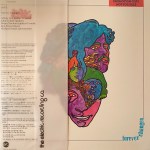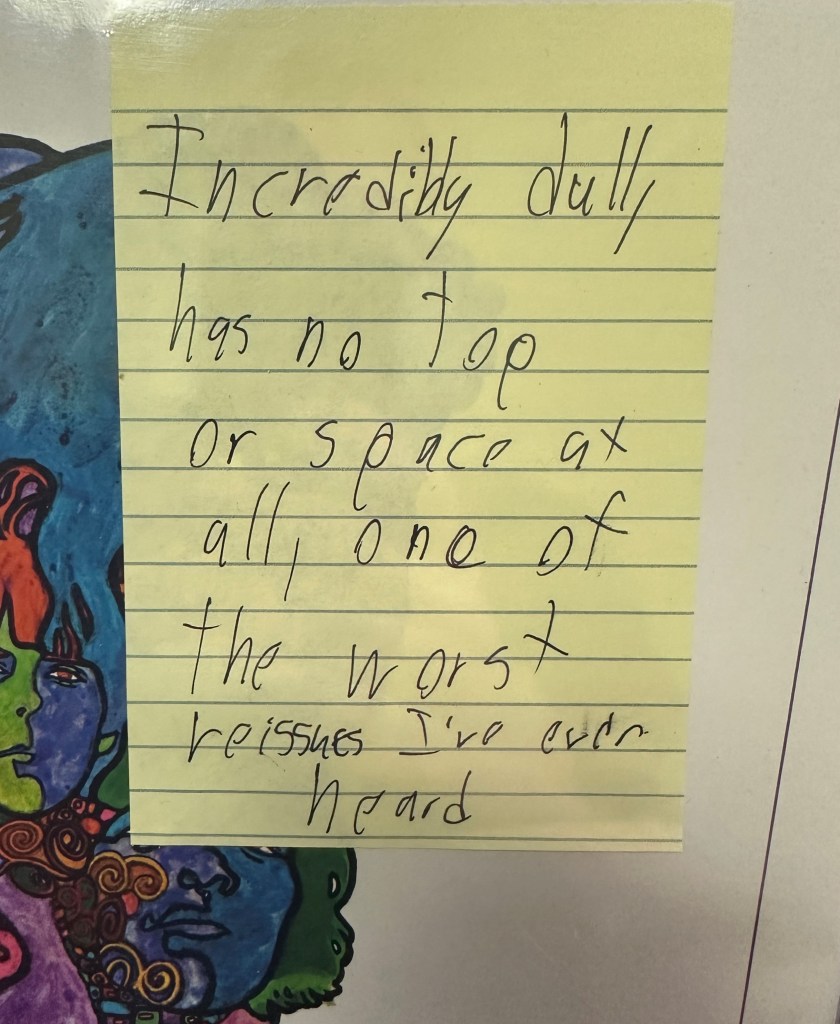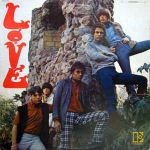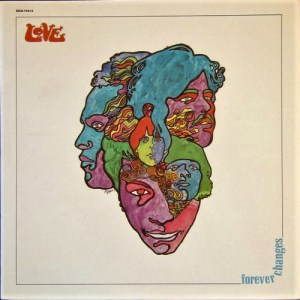 Our Review of The Electric Recording Company’s Release of Forever Changes
Our Review of The Electric Recording Company’s Release of Forever Changes
Recently we took the Electric Recording Company to task for their botched mastering of Love’s Forever Changes.
At ERC they like to point out they are doing things differently, and boy are they ever. They do not remaster the tapes, they simply transfer the tapes onto disc without any interference from equalizers, compressors and the like.
Naturally, they seem less willing to discuss the sludge-like sound their vintage tube cutting amplifiers bring to every tape that’s forced to go through them before it gets to the cutting stylus. I hope to discuss this issue in more depth down the road.
What Is It, Exactly
For now, let’s try to get to the heart of what this pressing is.
This is not an audiophile record, properly understood.
No member of the audiophile community, those lovers of sound you’ve heard so much about, could possibly put up with a record that sounds as bad as this one does.
Having played two of their releases and knowing how all of them are made, I would be surprised if any of this company’s records are any better than awful.
No, this is plain and simply a collectible.
It exists because it could be made as a very limited edition at a profit.
It exists because it could be made with exceptionally high quality packaging.
The vinyl inside the fancy packaging is only there to make sure that all the elements of a collectible release are accounted for.
All the value is tied up in the collector appeal of the release, none in the vinyl, because the vinyl is junk.
Record Store Day
If the price were a tenth of what ERC is asking, it would have made a perfectly good Record Store Day release.
Think about it: Collectors would have lined up around the block to get one of the only 350 numbered pressings made available. At 35 bucks, no doubt they would sell out within minutes of the doors opening. At 350 bucks, maybe it would take a bit longer, but they would sell out just the same.
Of course, Pete Hutchison does not want to wait a whole year to put out his cool, collectible records, one at a time. He sends them out to the customers on his waiting lists all year long.
Record lovers are buying these records with no way of having the vaguest clue as to how they sound. By the time the reviews come out, they are already out of print and on the collector market at multiples of their original price.
Why would an audiophile rush out to buy a record whose sound quality he has no way of knowing?
An audiophile wouldn’t. A record collector would though.
Record Collectors and Audiophiles
There are a great many more record collectors — here defined as those folks who just like collecting records — than there are audiophile record collectors, defined here as those who are trying, not always successfully, to collect good sounding records.
I suspect that most audiophiles of an analog persuasion fall into both camps.
They like having a collection of high quality pressings, and they like owning collectible records, often viewing the latter as a kind of investment that will pay off with profits in the future.
Collectors scramble to get in on the ground floor to own a cool new release, knowing that it’s sure to be worth more than they are paying for it.
If the sound quality is abysmal, what difference does that make?
No self-described audiophile should want a record that sounds as bad as those being produced by this ridiculous label.
But collectors should. The attention to detail in the packaging, the oh-so-limited production run, the fact that the records are indeed sourced from the master tape and mastered with tubes — these are qualities that appeal to collectors.
None of these things has a lot to do with the sound quality of the finished product except, in the case of this label, guaranteeing that it will be terrible.
A Nutty Approach to Making Records
As a lifelong skeptic, I know a crackpot when I see one, and Pete Hutchison is the dictionary definition of a crackpot. The idea that records don’t need to be mastered is not quite the same as the earth is hollow or the government is run by lizard people, but it falls into the same category: anything for which supporting evidence is non-existent.
crackpot: “one given to eccentric or wildly foolish notions.”
Transferring the tapes without the benefit of mastering equalization? That is a crackpot idea. Nobody does that except under the rarest of circumstances.
Are the great mastering engineers of the past — men like Robert Ludwig, Doug Sax, Bernie Grundman and others — known for their flat transfers? Did they ever hook up archaic tube equipment to their cutting lathes?
In the case of Robert Ludwig, we know his interventions in the case of Led Zeppelin II were as intense as they come. That explains why no other version of the album sounds like his version.
Would the world be better off had he not altered the sound of the tape in such a massive way? Is the bass on any other version of the album remotely as good as the bass on his version?
He put that bass on the record. It’s not on the tape. If it were on the tape somebody else would have come along and mastered it on to a record in the intervening 54 years since its release.
Without Robert Ludwig’s efforts, and the mastering equipment he had available to him in 1969, there can be no “hot mix” for Le Zeppelin II.
If you were to tell me that somebody new would get into the business of “remastering” records, on heavy vinyl, with fancy packaging, I would say “of course they will.” The world is full of these guys and they are making a fortune. Why wouldn’t somebody else want a piece of thet action? That’s how the free enterprise system is supposed to work. Competition is supposed to drive down prices and drive up quality.
Marketing Everything But High Quality Sound
Which is what makes The Electric Recording Company’s records so interesting.
They take a different approach to the market.
They offer the worst sound with the best packaging at the highest prices.
They engage in the pretense of offering audiophile sound when in fact they are doing no such thing.
But the audiophiles who are falling for this scam apparently cannot tell how bad sounding these ERC records are.
Perhaps they are so impressed by the packaging, the backstory, the collectability and who knows what else that they fail to notice how bad the sound is.
That would be the most charitable way of understanding how this label came to be so successful. I’m quite sure Mr. Hutchison is a millionaire many times over.
His snake oil is no cure for anything, but the story behind it and the fancy bottle it comes in is all that matters to the gullible types who are standing in line to fork over their cash and take their punishment.
And surely there are a good many owners of these records who know they are terrible and are just in the game to profit off those who have fallen for the collector hysteria that accompanies each new release.
As long as the status quo holds, and there simply are no audiophile reviewers with even the most rudimentary critical listening skills — the kind of basic skills that would be required to expose this fraud — then our English crackpot can continue to offer a product that appeals to the three groups who buy his records:
- collectors,
- speculators, and
- the hard of hearing.
Audiophiles with any sense — hopefully those who read this blog! — will steer clear of this man’s cosmetically appealing trash.
One Final Note
You may have seen this elsewhere on the site. We feel it bears repeating here.
For us, record collecting for the sake of record collecting has never held much appeal.
We like to play records, not just collect them, and we like to play records with the best sound we can find. We call those kinds of records Hot Stamper Pressings, and finding them, and making them available to other audiophiles, has been my life’s work.
All the collecting we leave to other people who enjoy that sort of thing.
Further Reading
This would include new pressings that were made with vintage tube equipment of shockingly poor quality, the kind that Mr Hutchison apparently finds to his liking, why, we cannot begin to imagine.
Hutchison is not alone in his predilection for ridiculously muddy records that sound like they are playing on your parent’s old console stereo. Here’s a good example of a title with plenty of Electric Recording Company “tubey magic,” if that’s what you’re after. It sounds every bit as bad, and it’s a lot cheaper than $350. Here’s another one.
- How can anybody not hear what’s wrong with old records like these?
- First get good sound – then you can recognize and acquire good records


 Our Story Begins
Our Story Begins


